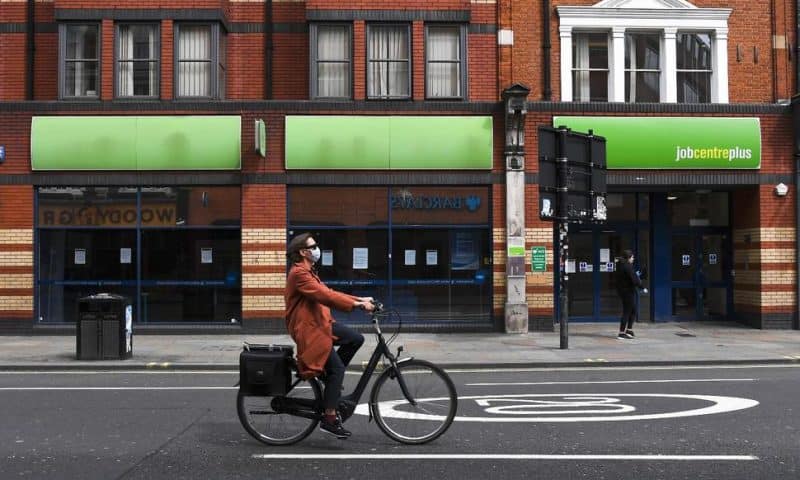Unemployment across the U.K. has held steady during the coronavirus lockdown as a result of a government salary support scheme, but there are clear signals emerging that job losses will skyrocket over coming months.
LONDON — Unemployment across the U.K. has held steady during the coronavirus lockdown as a result of a government salary support scheme, but there are clear signals emerging that job losses will skyrocket over coming months to levels not seen since the 1980s.
The Office for National Statistics said Thursday there were 649,000 fewer people, or 2.2%, on payrolls in June compared to March, when the British government imposed lockdown restrictions.
That’s an indication the country’s unemployment rate is set to rise during the summer months from the still historically low level of 3.9% recorded in May.
So far, Britain has been spared the sharp rises in unemployment seen in the United States, for example, because of the government’s Coronavirus Job Retention Scheme, which pays the majority of the salaries of workers who have not been fired. Some 1.2 million employers have taken advantage of the program to furlough 9.4 million people at a cost to the government of 28.7 billion pounds ($36 billion).
Though these workers have not been working over the past few months, they are not counted as unemployed. But the government is going to bring the program to an end in October, arguing that it gives “false hope” to furloughed workers while at the same time limiting their prospects of getting new jobs as their skills fade.
Instead, the government is pinning its hopes on the reopening of the economy and that there is no second coronavirus spike.
Already, many sectors, such as manufacturing, retail and hospitality have reopened, though none appears to be operating anywhere near pre-lockdown levels. The government is also expected to tweak its advice on working from home in an effort to get more people to go to the office, a move that it hopes could kickstart town centers.
“I think the best thing we can do is continue to open up the economy in a phased manner, a cautious manner, and get businesses up and running again,” Business Secretary Alok Sharma told the BBC.
However that pans out, the end of the salary support scheme is a potential cliff-edge moment that will put firms on the spot.
Do they keep those workers on furlough in post or do they let them go? It’s a tough call for firms facing a historic cash crunch following one of the deepest slumps ever recorded in the U.K. — the economy is around 25% smaller than it was in February before the full impact of the coronavirus.
“The policy is not a long-term solution, and some workers will be made unemployed in time, especially in sectors such as retail and travel where demand may remain structurally lower in the long-run,” said Kallum Pickering, senior economist at Berenberg Bank.
One of the U.K.’s leading business lobby groups warned Thursday that nearly a third of companies are planning to cut jobs in the next three months as the government winds down its salary scheme.
In a survey of 7,400 firms published Thursday, the British Chambers of Commerce said 29% of businesses are planning to cut the size of their workforce before the scheme comes to an end, with just 12% set to increase staff numbers.
The number of firms cutting jobs has accelerated in the past couple of weeks, with the likes of Airbus and Rolls Royce among many announcing big job cuts. Burberry cut another 500 jobs Thursday globally, including 150 in the U.K.
Many economists think unemployment could more than double to over 3 million this year, levels last seen in the 1980s when the government of Prime Minister Margaret Thatcher reoriented the economy away from heavy manufacturing toward services.
“There’s a national disaster unfolding,” said Frances O’Grady, general secretary at the umbrella Trades Union Congress. “But ministers are watching from the sidelines, instead of saving jobs with targeted support for the hardest-hit sectors like retail, manufacturing and aviation.”

